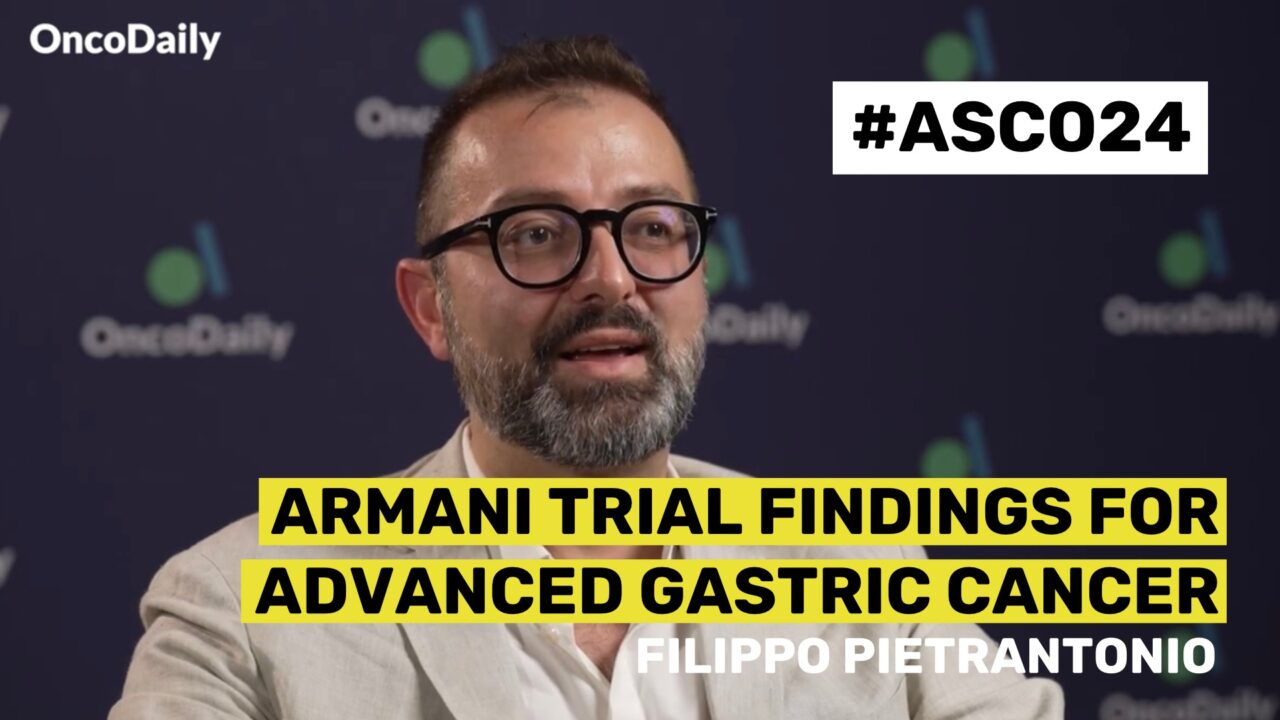The American Society of Clinical Oncology (ASCO) Annual Meeting is one of the largest and most prestigious conferences in the field of oncology. This year, the meeting took place from May 31 to June 4 in Chicago, Illinois. The event gathers oncologists, researchers, and healthcare professionals from around the world to discuss the latest advancements in cancer research, treatment, and patient care. Keynote sessions, research presentations, and panel discussions are typically part of the agenda, providing attendees with valuable insights into emerging trends and innovations in oncology.
This year, OncoDaily was at ASCO 2024 for the first time covering the meeting on-site. We had the pleasure of interviewing researchers who summarized the highlights of their work.
In this video, Filippo Pietrantonio, a GI medical oncologist at the National Cancer Institute of Milan, shares insights on ‘Ramucirumab plus paclitaxel as switch maintenance versus continuation of oxaliplatin-based chemotherapy in patients (pts) with advanced HER2-negative gastric or gastroesophageal junction (GEJ) cancer: The ARMANI phase III trial.‘
Hi everyone, my name is Filippo Pietrantonio. I’m a GI medical oncologist at the National Cancer Institute of Milan in Italy. So here at ASCO 2024, I presented the results of an Italian phase 3 trial, the ARMANI trial.
This trial investigated the switch maintenance with paclitaxel plus ramucirumab versus continuation of standard first-line oxaliplatin-based chemotherapy in patients with HER2-negative advanced gastric or gastroesophageal junction (GEJ) adenocarcinoma. A little background on the trial: we know that platinum-fluoropyrimidine doublets are the standard first-line therapy, at least in patients with low or absent PD-L1 expression, as the addition of immune checkpoint inhibitors is not approved or recommended in several countries in this patient population.
We also know outcomes need improvement, and the chance of receiving active second-line therapy is quite low, around 40–50% even in clinical trials. Additionally, adding the anti-VEGF receptor 2 monoclonal antibody ramucirumab to first-line cisplatin-fluoropyrimidine chemotherapy did not improve progression-free survival (PFS) or overall survival (OS). However, paclitaxel plus ramucirumab is the standard second-line therapy.
The ARMANI trial was designed in Italy to investigate whether paclitaxel plus ramucirumab as switch maintenance, or so-called “early second-line” therapy, could be superior to continuing oxaliplatin-based chemotherapy after a three-month induction with FOLFOX or CAPOX. The trial enrolled 280 patients who achieved disease control after FOLFOX or CAPOX for three months, then randomized them to either the experimental arm with paclitaxel plus ramucirumab or to continued first-line chemotherapy.
The primary endpoint was progression-free survival, and it was met: switching to paclitaxel plus ramucirumab significantly improved progression-free survival, with a median of 6.6 months in the experimental arm versus 3.5 months in the control arm, yielding a hazard ratio of 0.64, which was statistically significant. Overall survival, a key secondary endpoint, was also significantly improved by switching to paclitaxel plus ramucirumab, with a hazard ratio of 0.75.
In terms of safety, paclitaxel plus ramucirumab had a higher rate of grade 3 or more treatment-related adverse events, but this safety profile was predictable and aligned with existing literature, with no new safety concerns. Therefore, based on our results, paclitaxel plus ramucirumab may represent a new post-induction strategy for patients ineligible for upfront immune checkpoint inhibitors or, potentially in the future, for those eligible for claudin 18.2 targeting agents like zolbetuximab. Ongoing translational analyses from this trial will be presented at future conferences. Thank you very much.
More videos and content from ASCO 2024 on OncoDaily.


